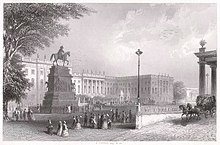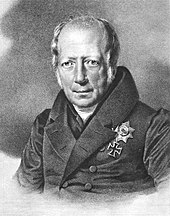Humboldt's ideal of education

Under the Humboldt's ideal of education means the holistic education in the arts and sciences in conjunction with the respective study direction . This ideal goes back to Wilhelm von Humboldt , who during the Prussian convalescence was able to rely on a strengthening bourgeoisie and thereby promoted the right to general education. Today the term denotes the central idea of the unity of research and teaching at universities and colleges that are equivalent to them (in contrast to pure teaching professorships without research tasks).
Conceptual reference
As head of the section on culture and public education in the Prussian Ministry of the Interior, Humboldt incorporated this ideal into the educational reforms. In terms of concrete policy, it did not extend to the Prussian elementary schools, which, along with the universities, were also subordinate to the section. This is why the Humboldt university ideal is also occasionally spoken of.
Humboldt's ideal of education relates to his statements to the Prussian king, to whom he wrote: “There is absolutely certain knowledge that must be general, and even more a certain formation of attitudes and character, which no one should be missing. Everyone is evidently a good craftsman, merchant, soldier and businessman only if he is a good, decent person and citizen who is enlightened according to his status and regardless of his particular profession. If school lessons give him what is necessary for this, he will acquire the special ability of his profession so easily afterwards and always retain the freedom, as so often happens in life, to move from one to the other. "For Humboldt, the training (was not entitled to a profession), but education (in the sense of humanism ).
Historical overview
The Humboldtian ideal of education developed around the two central concepts of the bourgeois Enlightenment: the concept of the autonomous individual and the concept of cosmopolitanism . The university should be a place where autonomous individuals and world citizens are produced or produce themselves.
- An autonomous individual should be an individual who achieves self-determination (autonomy) and maturity through the use of reason .
- Cosmopolitanism is that collective bond that connects autonomous individuals, regardless of their social and cultural socialization : Humboldt says: "To transform as much of the world as possible into oneself is life in the higher sense of the word." aim to work as comprehensively as possible on the world and thereby develop as a subject. “To become a global citizen means to grapple with the great questions of humanity: to strive for peace, justice, the exchange of cultures, different gender relations or a different relationship to nature.” University education should not be professional, but should be independent of economic interests Be training.
Academic freedom means first of all external independence of the university. The university should evade state influences. Humboldt demands that the scientific university should “break free from all forms in the state”. His university concept therefore stipulated that, for example, the Berlin university should have its own goods in order to finance itself and thereby secure its economic independence. Academic freedom demands, in addition to the external independence of the university from state and economic constraints, internal autonomy, i.e. H. the free choice of studies, the free organization of studies and the free representation of doctrinal opinions and teaching methods. The university should therefore be a place of permanent public exchange between all those involved in the scientific process. The integration of their knowledge should come about with the help of philosophy . This is supposed to represent a kind of basic science that allows members of various scientific disciplines to exchange their findings and to link them with one another. For a long time, the Humboldtian ideal of education had a decisive influence on German university history, even if it was practically never fully realized or is feasible. Great intellectual achievements in German science are associated with it.
Theodor W. Adorno , Noam Chomsky , Albert Einstein , Sigmund Freud , Georg Wilhelm Friedrich Hegel , Karl Marx , and Friedrich Nietzsche have committed themselves to this.
Current situation and development
While at the time of Humboldt, universities mainly carried out state-organized academic research, today there are other forms of higher education in the tertiary education sector that have a scientific mandate for research. The demands of the Humboldt ideal of education can accordingly also be transferred to these universities.
Critics see the numerous reforms, such as B. the Bologna Process , a deviation from the Humboldt ideal towards a more professional orientation of the study with consideration of economic interests. It is also criticized that the freedom of teaching is restricted by the Bologna Process. As a result of the so-called economization of the education system, the Humboldtian ideal of education is experiencing a semantically shifted renaissance, for example, as the “autonomous individual” is reinterpreted as an economic subject and the “independence of the university” is understood to mean that the university competes as a market player other universities must claim.
criticism
Humboldt's striving for a human society of equals met with a lot of skepticism, as this ideal was viewed by many critics as unrealistic. Contemporaries such as the ministerial official Ludolph von Beckedorff argued that Humboldt's ideas were not enforceable because there were differences in society between professions or classes that necessarily led to inequality. That too was educated middle class intent on demarcation.
Even today, the fact that there are more or less strictly separated educational paths in Germany contradicts Humboldt's principles. It is already decided in the early years of the child which type of school it will attend. Due to different learning opportunities, every child takes a different educational path and achieves a different school leaving certificate, which has the consequence that there are inequalities in the level of education. Even today there are social factors that can appear as educational obstacles, such as gender, religion and origin.
While Humboldt understood "education" to mean the development of personal abilities and talents, today's society places less value on the abilities of people than on specific, verifiable achievements that are determined according to a certain standard. At this point, the focus is placed on the fulfillment of social requirements, instead of, as Humboldt's ideal, on educating people individually. Education critics such as the Frankfurt educational theorist Heinz-Joachim Heydorn find that under the principles of today's educational policy, the individual cannot develop his or her own personal development because he or she has to fit in and submit to society or the economy.
At the time, Humboldt's ideal was criticized for the fact that the goal of education would only become clear over the years, because people should not limit themselves to certain possibilities when developing personally, but should rather strive for all possibilities. Conversely, it was argued that people should concentrate on their personal work to avoid neglecting their work because of too wide a range of opportunities.
literature
- Franzjörg Baumgart: Between reform and reaction. Prussian school policy 1806-1859. Scientific Book Society, Darmstadt 1990, ISBN 3-534-02116-9 .
- Federal Minister for Education and Science, Public Relations Department (Ed.): Humboldt and the University today. Symposium of the Federal Minister for Education and Science on April 17, 1985 in the Bonn Science Center. Bonn 1985. (without ISBN)
- Dietrich Benner : Wilhelm von Humboldt's theory of education. A problem-historical study on the justification of modern educational reform. 3rd extended edition, Juventa, Weinheim / Munich 2003, ISBN 3-7799-1715-7 .
- Ulrike Büchner: Work and Individualization. On the change in the relationship between work, education and personal development in Germany. Beltz, Weinheim / Basel 1982, ISBN 3-407-58163-7 . (Habilitation thesis, Technical University Berlin, 1981.)
- Oliver Fohrmann: In the mirror of money. Education and Identity in Times of Economization . transcript-Verlag, Bielefeld 2016. ISBN 978-3-8376-3583-6 .
- Hermann von Helmholtz : About the academic freedom of the German universities. Speech given at the beginning of the rectorate at the Friedrich-Wilhelms-Universität zu Berlin on October 15, 1877. Hirschwald, Berlin 1878. / as reprint : University Library of the Humboldt University of Berlin, Berlin 2005. (= Multum, non multa , Volume 14.) (without ISBN)
- Clemens Menze (ed.), Wilhelm von Humboldt: Education and Language. 5th revised edition, Schöningh, Paderborn 1997, ISBN 3-506-78324-6 .
- Wilhelm von Humboldt: Writings on politics and education. (= Wilhelm von Humboldt, works , part 4.) 6th edition, Wissenschaftliche Buchgesellschaft, Darmstadt 2002, ISBN 3-534-15858-X .
- Wilhelm von Humboldt: Ideas for an attempt to determine the limits of the effectiveness of the state. (= Reclams Universal Library , Volume 1991.) Reclam, Stuttgart 1995, ISBN 3-15-001991-5 .
- Joachim H. Knoll , Horst Siebert: Wilhelm von Humboldt. Politics and education. Quelle & Meyer, Heidelberg 1969. (without ISBN)
- Clemens Menze: The educational reform of Wilhelm von Humboldt. Schroedel, Hannover et al. 1975, ISBN 3-507-38149-4 .
- Wilhelm Richter: The change in the educational concept. The von Humboldt brothers, the age of education and the present. (= Historical and Pedagogical Studies , Volume 2.) Colloquium-Verlag, Berlin 1971, ISBN 3-7678-0295-3 .
- Franz Schultheis (Ed.): Humboldt's nightmare. The Bologna Process and its Consequences. UVK, Konstanz 2008, ISBN 978-3-86764-129-6 .
- Youngkun Tschong (Yŏng-gŭn Chŏng): character and education. On the basis of Wilhelm von Humboldt's theoretical educational thinking. Königshausen & Neumann, Würzburg 1991, ISBN 3-88479-629-1 . (Dissertation, University of Cologne, 1991.)
- Hans-Josef Wagner: The topicality of the structural education theory of Humboldt. Deutscher Studien-Verlag, Weinheim 1995, ISBN 3-89271-597-1 .
- Marie-Élise Zovko: Bologna and Beyond. A Critical Reflection of the Ends and Means of the Bologna Process. In: Andreas Arndt, Jure Zovko (Ed.): Progress? (= Studia philosophica Iaderensia , Volume 1.) Wehrhahn-Verlag, Hanover 2011, ISBN 978-3-86525-197-8 , pp. 195-232.
Web links
- Wilhelm von Humboldt's idea of the university
- Jürgen Hofmann: What significance does the Humboldt legacy have for our time?
Single receipts
- ^ P. Berglar (1970): Wilhelm von Humboldt, p. 87
- ↑ Jürgen Hofmann: What significance does the Humboldt legacy have for our time?
- ↑ Video: Danovitch Interviews Chomsky (2013)
- ↑ cf. Higher education laws of the federal states
- ↑ Oliver Fohrmann: In the mirror of money. Education and Identity in Times of Economization. transcript, Bielefeld, ISBN 978-3-8376-3583-6 .
- ^ German school history from 1800 to the present. Juventa, p. 48, the documents can be found in full in L.Schweim (ed.): Schulreform in Preußen 1809-1819. Weinheim / Berlin, Beltz 1966.
- ^ Heinz-Elmar Tenorth: Education - Resource in Conflict. In: History in Science and Education - GWU 63 (2012), 9/10, pp. 567-581.
- ^ Wilhelm von Humboldt: The Lithuanian school plan. In: Ders .: Education and Language. 5th, revised edition, Paderborn 1997, p. 113.
- ↑ Bernard Mandeville: An ESSAY on CHARITY, and charity schools. In: Ders .: The Fable of the Bees or Private Vices, Publick Benefits, Vol. 1 [1732] Indianapolis 1988, pp. 282 ff.
